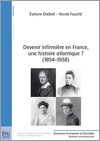Appel à contribution – Literature and Chemistry : Elective Affinities
Interdisciplinary conference organized by the research group Literature and Science
The University of Bergen, Norway 27-28 October 2011
Invited speakers include:
Luigi Dei, Professor of Chemistry, Università di Firenze, on Primo Levi’s bridging of chemistry and literature
Robert Gordon, Reader in Modern Italian Culture, Cambridge University, on Primo Levi
Bernard Joly, Professor of the History and Philosophy of Science, Université de Lille 3, on the figure of the alchemist in 19th and 20th century fiction
Marek Krawczyk, Rector of Medical University of Warsaw, on the life and scientific achievements of Marie Sklodowska-Curie, the winner of the 1911 Nobel Prize in Chemistry
George Rousseau, Professor of History, Oxford University, on science-politics, nostalgia and Ludwig Boltzmann
Sharon Ruston, Professor of English Literature, University of Salford, on Humphry Davy and British Romanticism
Leiv K. Sydnes, Professor of Chemistry, Universitetet i Bergen, on Oxygen
Conference topic
Chemistry is the art of separating, weighing, and distinguishing: these are three useful exercises also for the person who sets out to describe events or give body to his own imagination. Moreover, there is an immense treasure of metaphors that the writer can take from the chemistry of today and yesterday, which those who have not frequented the laboratory and factory know only approximately. […] Even a layman knows what to filter, crystallize, and distil means, but he knows it only at second hand: he does not know “the passion infused by them”, he does not know the emotions that are tied to these gestures, has not perceived the symbolic shadow they cast. These are the words of the Italian novelist and essayist Primo Levi (1919-1987), chemist and survivor of Auschwitz, who wrote extensively on chemistry.
Designated the UNESCO International Year of Chemistry, 2011 also commemorates the 100th anniversary of Marie Curie’s Nobel Prize in Chemistry, awarded for her ground-breaking studies in radium and polonium. The relationship between literature and chemistry has a long history, reaching back to the time before the existence of chemistry as a scientific discipline, to alchemy and natural philosophy, and to philosophers and poets like Epicurus and Lucretius. Goethe’s novel Elective Affinities (1809) represents one of the most notable metaphoric explorations of chemistry; with its suggestion of human connections as originating at a biochemical level. The chemist Humphry Davy had a direct influence on Wordsworth and Coleridge. In his 1880 essay “The Experimental Novel”, Emile Zola stated that his great source of inspiration as a novelist was the physiologist Claude Bernard, who studied the chemistry of the body. Other authors who have treated and explored alchemy and chemistry are E.T.A. Hoffmann, Mary Shelley, Poe, Dickens, Turgenev, Yeats, Joyce, Strindberg, Proust, Balzac, Zola, Asimov, Pynchon, Updike, not to mention philosophers as different as Comte, Jung and Bachelard. Chemistry also plays an important role in crime and detective fiction, in apocalyptic literature and in SF literature.
Together with its ancestor alchemy, chemistry has always had a darker and troubling side, infected with the guilt of hubris, of artifice and contamination, faults that, since Plato, have also been associated with literature. A hybrid science, posed between the technological and the theoretical, between observation and experiment, chemistry can be said to share with literature many of its fundamental processes of creation and epistemological problems of representation. The French chemist Marcellin Berthelot (1827-1907) stated that, like literature and art, chemistry creates its object, and that the creative faculty forms an essential distinction between chemistry and the other natural or historical sciences.
Call for papers:
For this conference we welcome a range of approaches – historical, theoretical, ethical and aesthetical – to the encounters and affinities between literature and chemistry. Proposed topics might address:
Literary representations of the chemical sciences
The nomenclature of chemistry; tools and languages of representation
(chemical terms as literary metaphors)
The cultural and intellectual history of chemistry
The philosophy of chemistry
The symbolism of the elements
SF and chemistry
The chemical mind and body in literature
Chemistry and hubris – the ethics of chemistry
Artificiality and naturalness
Contamination, pollution, radiation
The organizers invite proposals for twenty-minute research papers on these or other aspects of the conference topic.
The organizers will consider publishing the proceedings of the workshop.
Please e-mail your proposed topic and preliminary paper title by 30 June, followed by a 250-word abstract by 1 September, to the following address:
margareth.hagen@if.uib.no
If you have any questions, please do not hesitate to contact us:
Randi.koppen@if.uib.no
Margareth.hagen@if.uib.no
Margery.skagen@if.uib.no
http://www.uib.no/fg/litt_vit/nyheter/2011/04/literature-and-chemistry
 Évelyne Diebolt et Nicole Fouché, Devenir infirmière en France, une histoire atlantique? (1854-1938), Editions Publibook, 2011, 342 p.
Évelyne Diebolt et Nicole Fouché, Devenir infirmière en France, une histoire atlantique? (1854-1938), Editions Publibook, 2011, 342 p.